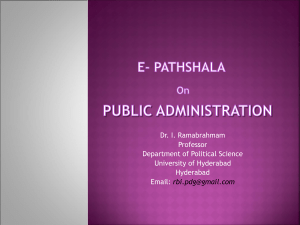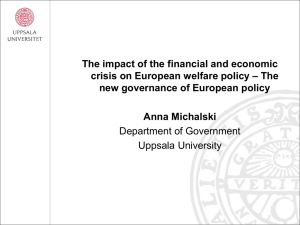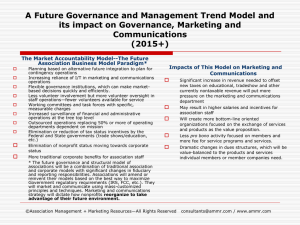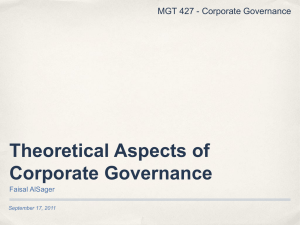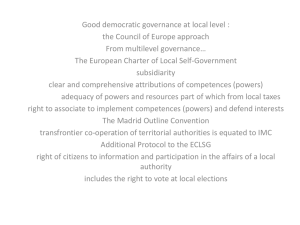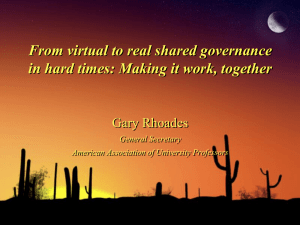Political leadership and interactive governance
advertisement
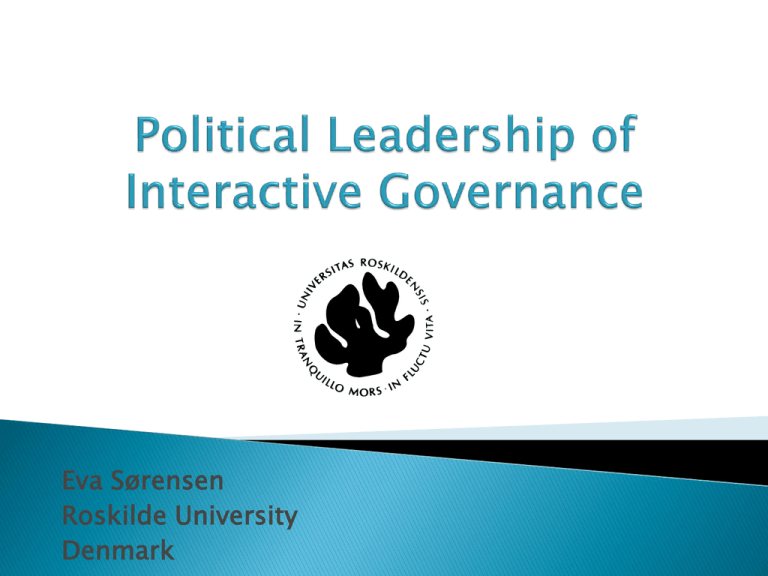
Eva Sørensen Roskilde University Denmark Approach the question of the future role of the state from a governance research perspective A state that seeks to govern through the mobilization of public and private actors through interactive forms of governance Governance theory has introduced the concept of meta-governance understood as ‘the governance of governance’ to describe this new role Meta-governance is exercised through the institutional design and facilitation of interactive governance arenas Meta-governance theories tends to reduce public leadership to a meta-management that aims to ensure efficient and effective governance In consequence they under-emphasize that metagovernance also involves the exercise of political meta-leadership Recent theories of political leadership can inspire efforts to strengthen the political aspect of metagovernance Explore how recent theories of political leadership can contribute to developing an analytical framework for studying the role and functioning of political leadership of interactive governance processes Purpose of lecture Political leadership aims to lead a political community Robert C. Tucker: Leadership as Politics (1995). Political leadership is a function rather than a position, and the role as political leader is obtained through the ability to serve this function rather than through formal authorization Three leadership functions: Construction of a problem diagnosis that calls for political action Proposition of a strategy for dealing with the problems Mobilization of support for the problem definition and strategy for solving it Joseph (2009). Masciulli et al: Political Leadership Adaptive political leadership: Reactions to changing conditions that take the form of marginal adjustments of existing problem definitions and policies (reform) Innovative political leadership: Proactive development of a new problem diagnoses and strategies (revolution) Radical political innovation is risky because it tends to disregard contextual factors in the quest for a new beginning Two forms of political leadership Political leadership is basically about story telling Political story telling is a necessary element in government as well as in interactive governance Political leadership is not a prerogative of formally authorized politicians, but can be performed by other actors Empirical studies must investigate how these functions are carried out and by whom Political leadership both involves adaptive and innovative policy making Important insights Political leadership involves the mobilization of the political community in formulating problem diagnoses and political strategies – as well as in realizing the strategies Benefits of involving the political community in policy making: Contributes to a contextual and negotiated problem understanding Helps to develop and test new political solutions Builds political ownership Political ambitions determine the space for political leadership Adaptive meta-politics overlaps with metamanagement Innovative meta-politics is different from metamanagement Innovative political leadership Adaptive political leadership Metamanagement Overlap between the political and managerial aspect of meta-governance There is currently a happy marriage between adaptive political leadership and meta-management Politicians can either engage in adaptive policy making or become marginalized – while seeing other actors take on the role as innovative political leaders Theories of meta-governance have consolidated the marriage but should instead highlight the constitutive role of political leadership in interactive governance New experiments with interactive policy innovation in Denmark indicate that politicians’ ability to serve as innovative political leaders is promoted through new interactive governance arenas (Agger & Sørensen, 2014) Current conditions for political leadership Thank you for listening






